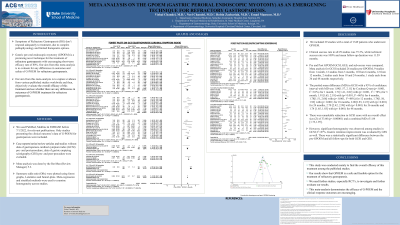Monday Poster Session
Category: Stomach
P2725 - Meta-Analysis on Gastric Per-Oral Endoscopic Myotomy as an Emerging Technique for Refractory Gastroparesis
Monday, October 23, 2023
10:30 AM - 4:15 PM PT
Location: Exhibit Hall

Has Audio

Vishal Chandel, MD
Suburban Community Hospital
Feasterville-Trevose, PA
Presenting Author(s)
Vishal Chandel, MD1, Neel Chandel, MD2, Robin Zachariah, MD3, Emad Mansoor, MD4, Zubair Malik, MD5, Henry Parkman, MD5
1Suburban Community Hospital, Feasterville-Trevose, PA; 2St. Mary Medical Center, Feasterville-tTevose, PA; 3Duke University Hospital, Durham, NC; 4Case Western Reserve University / University Hospitals, Cleveland, OH; 5Temple University Hospital, Philadelphia, PA
Introduction: Symptoms of Refractory Gastroparesis (RG) don’t respond adequately to treatment, due to complex pathophysiology and limited therapeutic options. Gastric per-oral endoscopic myotomy (GPOEM) is a promising novel technique for the treatment of RG with encouraging short-term efficacy rate of 80%. Our aim from this meta-analysis is to evaluate for any differences in outcomes and safety of G-POEM for RG.
Methods: We used PubMed, Medline & EMBASE before 7/1/2022, for relevant publications. Only studies presenting the clinical outcome’s data of G-POEM for gastroparesis were included. Studies without data of gastroparesis cardinal symptom index (GCSI) pre- and post-procedure, data of gastric emptying scintigraphy (GES) pre- and post-procedure were excluded. Meta-analysis was done by the RevMan (Review Manager) 5.3.
Results: We included 29 studies with a total of 1349 patients who underwent GPOEM. Clinical success rate in all 29 studies was 75.3%, while technical success rate was 100% and mean follow-up duration was 11.59 months. Pre and Post GPOEM GCSI, GES, and sub-scores were compared. Meta analysis for GCSI included 26 studies pre-GPOEM, 9 studies from 1 month, 12 studies from 3 months, 10 from 6 months, 12 from 12 months, 2 studies each from 18 and 24 months, 1 study each from 36 and 48 months respectively. The pooled mean difference (MD) in GCSI with a 95% of confidence interval with MD was 1.84[1.57, 2.11] by Cochran Q test (p< 0.001, I2 =81%) for 1 month, 1.71[1.41, 2.02] with (p< 0.001, I2 = 78%) for 3 month, 1.91[1.65, 2.18] with (p< 0.001, I2 =86%) for 6 months, 1.78[1.51, 2.06] with (p< 0.001, I2 =88%) for 12 months, 1.74[1.56, 1.92] with (p< 0.001) for 18 months, 2.08[1.93, 2.23] with (p< 0.001) for 24 months, 2.70 [2.42, 2.98] with (p< 0.001) for 36 months and 1.74 [1.65, 1.83] with (p< 0.001) for 48 months. There was remarkable reduction in GCSI score with an overall effect size (Z) of 33.60 (p< 0.00001) and a combined MD of 1.84 [1.73,1.95]. However, significant heterogeneity was observed among studies in GCSI; I2=87%. Gastric retention improvement was evaluated by GES as well. There was a statistically significant difference between the pre-GPOEM and all follow-ups for both GCSI and GES.
Discussion: Our results show that GPOEM is a safe and feasible option for the treatment of RG. We need further studies, especially RCT’s, to investigate for further evaluation of our results. This meta-analysis demonstrates the efficacy of G-POEM and the clinical response outcomes are encouraging.

Disclosures:
Vishal Chandel, MD1, Neel Chandel, MD2, Robin Zachariah, MD3, Emad Mansoor, MD4, Zubair Malik, MD5, Henry Parkman, MD5. P2725 - Meta-Analysis on Gastric Per-Oral Endoscopic Myotomy as an Emerging Technique for Refractory Gastroparesis, ACG 2023 Annual Scientific Meeting Abstracts. Vancouver, BC, Canada: American College of Gastroenterology.
1Suburban Community Hospital, Feasterville-Trevose, PA; 2St. Mary Medical Center, Feasterville-tTevose, PA; 3Duke University Hospital, Durham, NC; 4Case Western Reserve University / University Hospitals, Cleveland, OH; 5Temple University Hospital, Philadelphia, PA
Introduction: Symptoms of Refractory Gastroparesis (RG) don’t respond adequately to treatment, due to complex pathophysiology and limited therapeutic options. Gastric per-oral endoscopic myotomy (GPOEM) is a promising novel technique for the treatment of RG with encouraging short-term efficacy rate of 80%. Our aim from this meta-analysis is to evaluate for any differences in outcomes and safety of G-POEM for RG.
Methods: We used PubMed, Medline & EMBASE before 7/1/2022, for relevant publications. Only studies presenting the clinical outcome’s data of G-POEM for gastroparesis were included. Studies without data of gastroparesis cardinal symptom index (GCSI) pre- and post-procedure, data of gastric emptying scintigraphy (GES) pre- and post-procedure were excluded. Meta-analysis was done by the RevMan (Review Manager) 5.3.
Results: We included 29 studies with a total of 1349 patients who underwent GPOEM. Clinical success rate in all 29 studies was 75.3%, while technical success rate was 100% and mean follow-up duration was 11.59 months. Pre and Post GPOEM GCSI, GES, and sub-scores were compared. Meta analysis for GCSI included 26 studies pre-GPOEM, 9 studies from 1 month, 12 studies from 3 months, 10 from 6 months, 12 from 12 months, 2 studies each from 18 and 24 months, 1 study each from 36 and 48 months respectively. The pooled mean difference (MD) in GCSI with a 95% of confidence interval with MD was 1.84[1.57, 2.11] by Cochran Q test (p< 0.001, I2 =81%) for 1 month, 1.71[1.41, 2.02] with (p< 0.001, I2 = 78%) for 3 month, 1.91[1.65, 2.18] with (p< 0.001, I2 =86%) for 6 months, 1.78[1.51, 2.06] with (p< 0.001, I2 =88%) for 12 months, 1.74[1.56, 1.92] with (p< 0.001) for 18 months, 2.08[1.93, 2.23] with (p< 0.001) for 24 months, 2.70 [2.42, 2.98] with (p< 0.001) for 36 months and 1.74 [1.65, 1.83] with (p< 0.001) for 48 months. There was remarkable reduction in GCSI score with an overall effect size (Z) of 33.60 (p< 0.00001) and a combined MD of 1.84 [1.73,1.95]. However, significant heterogeneity was observed among studies in GCSI; I2=87%. Gastric retention improvement was evaluated by GES as well. There was a statistically significant difference between the pre-GPOEM and all follow-ups for both GCSI and GES.
Discussion: Our results show that GPOEM is a safe and feasible option for the treatment of RG. We need further studies, especially RCT’s, to investigate for further evaluation of our results. This meta-analysis demonstrates the efficacy of G-POEM and the clinical response outcomes are encouraging.

Figure: GCSI forest plots for refractory gastroparesis.
Disclosures:
Vishal Chandel indicated no relevant financial relationships.
Neel Chandel indicated no relevant financial relationships.
Robin Zachariah indicated no relevant financial relationships.
Emad Mansoor indicated no relevant financial relationships.
Zubair Malik indicated no relevant financial relationships.
Henry Parkman indicated no relevant financial relationships.
Vishal Chandel, MD1, Neel Chandel, MD2, Robin Zachariah, MD3, Emad Mansoor, MD4, Zubair Malik, MD5, Henry Parkman, MD5. P2725 - Meta-Analysis on Gastric Per-Oral Endoscopic Myotomy as an Emerging Technique for Refractory Gastroparesis, ACG 2023 Annual Scientific Meeting Abstracts. Vancouver, BC, Canada: American College of Gastroenterology.
